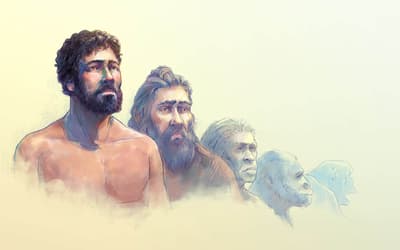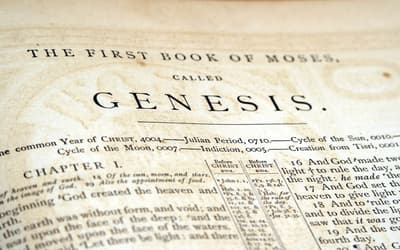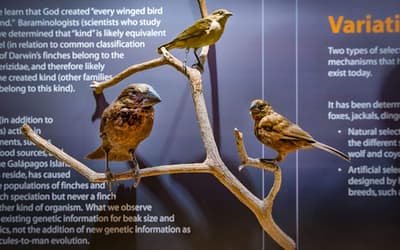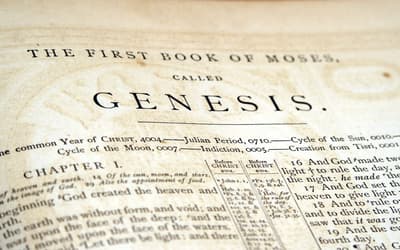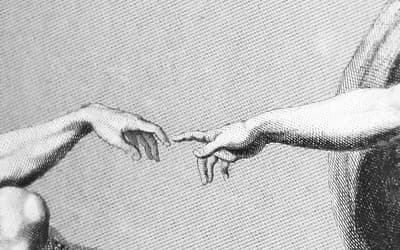The views expressed in this paper are those of the writer(s) and are not necessarily those of the ARJ Editor or Answers in Genesis.
Abstract
The presence of moral evil (sin) in the world is relatively easy for the Christian creationist to explain, and free choice is key to that explanation. To Christian evolutionist and professor of biology Daniel Brannan, the idea of a very good Creation and an Adam and Eve who were deceived and sinned is not only incoherent but also makes God the cause of sin. Brannan proposed that Christians accept an Irenean sense of original sin, which entails that Adam was essentially an undeveloped child. Adam was deceived by Satan because he was incapable of distinguishing right from wrong, and Adam had no free choice. How could Adam and Eve have chosen between good and evil, when only after eating of the tree did they achieve that ability? How could they even have been responsible for their choosing, when their eyes were open only after their choice and eating? This paper will show that Brannan’s arguments are based on faulty premises regarding Adam’s constitutional nature, the nature of Adam and Eve’s perfection and Adam’s power of free choice. Adam was not deceived, and God is not the cause of sin.
Keywords: Adam, consciousness, constitution, Creation, Eve, evolution, free choice, free will, guilt, knowledge, mental state, moral agent, nature, shame, sin.
Introduction
Scripture informs us that sin entered the world through Adam, “and death through sin, and thus death spread to all men” (Romans 5:12). This text forms the basis of the doctrine of original or inherited sin, thus answering the question of the source or cause of mankind’s inherent tendency to sin (cf. Psalm 51:5, 58:3; Ecclesiastes 9:3; Romans 7:18–25; Ephesians 2:3) and their natural disposition in relation to God.1
Daniel Brannan (2007; 2011) is a Christian evolutionist and professor of biology at Abilene Christian University, who has registered two objections to this doctrine. Following theologian F. LeRon Shults (2003), he asked:
If they [Adam and Eve] were perfectly wise, why were they misled? If they were created foolish (and since folly is the greatest of the vices), why is God the author of vice? (Brannan 2007, p. 191).
The idea that Adam and Eve were created very good and able to sin also
fails a coherence test. If Adam and Eve were “perfect,” why did they sin? Does not this make God the author of sin since he created them in such a manner to sin? Knowing that their free will would be abused, why did God created them in such a manner? (Brannan 2011, p. 162).2
Formally, his argument can be stated as follows:
- Adam and Eve were created very good, including perfectly wise. A perfectly wise person cannot be deceived, and a very good person will choose to do good.
- Adam and Eve were deceived and chose to sin.
- Therefore, Adam and Eve were created less than perfect and not very good, and God is the cause of sin.3
Brannan’s objections require that he proposes a better explanation for the source and reality of human sin in the world than the Genesis record and the rest of Scripture. Thus, in order to “reintegrate Darwinian thought into theology,” Brannan proposed an “Irenean sense of original sin” (Brannan 2007, p. 192, footnote 12; Brannan 2011, pp. 144–147).4 For the “church Father” Irenaeus (AD 120–202), Adam was essentially an undeveloped child. Adam was deceived by Satan, which means that he could not have been responsible for his disobedience. Adam had no free choice, and therefore was not capable of reasoning right from wrong. The deception allowed Adam to become aware; it was part of his development into a moral being.5 In this view, Adam also did not commit the first sin, Cain did.
If the apologist can show that Brannan’s objections and his Darwinian/Irenean proposal are based on faulty premises and are inconsistent with Scripture, then his conclusions would not follow. This is the project in the rest of this paper. Instead of responding to every item of his proposal, I will argue that Adam was created very good and in mature form, including his mental faculties. Adam was not deceived, which means that he was perfectly aware of what Eve did and could therefore have chosen not to sin. It follows that Adam was a free moral agent and that God is not the cause of sin in the world.
Adam Was Created Very Good and in Mature Form, Including His Mental Faculties
According to the Genesis record, the creation of Adam and Eve was the result of an intentional act of God (Genesis 1:26–27), on the sixth Day of Creation (Genesis 1:24–31). They were created in the image of God6 and with a specific purpose in mind: to rule over God’s earthly creation. At the end of the Creation Week (of seven literal 24-hour Days),7 God looked at His created works and declared them “very good” (Genesis 1:31). As to the manner of Adam’s creation, Scripture states: “And the Lord God formed man of the dust of the ground, and breathed into his nostrils the breath of life; and man became a living being [or soul or creature]” (Genesis 2:7). These texts reveal three truths about Adam relevant to the discussion that is to follow: the meaning of “very good,” the creation of Adam in mature form, and Adam’s constitutional nature. We will consider these in that order. But first a few remarks about Genesis 2:7.
Adam was neither a self-caused being, nor the product of some ape-like creature, nor the product of mindless processes of nature.
The text (in context) allows for a number of immediate inferences. First, Adam was neither a self-caused being, nor the product of some ape-like creature, nor the product of mindless processes of nature. When the text is allowed to speak for itself, no evidence for any form of evolution over millions of years can be found. Thus, to support any form of evolution is to stretch Scripture beyond what interpretation permits.
Second, God’s work or action—immediate and direct—is the focus of the text. This understanding is supported by several other biblical passages, for example, “Know that the Lord He is God; It is He who has made us, and not we ourselves . . .” (Psalm 100:3); “And He [Jesus] answered and said, Have you not read that He who made them at the beginning ‘made them male and female’ . . .” (Matthew 19:4); “For we are His workmanship . . .” (Ephesians 2:10). In Genesis 2:7 a potter’s term, yatzar, meaning “to form” or “fashion,” is used for the creation of man (Brown, Driver, and Briggs 1972, pp. 427–428) and in Genesis 2:22 an artistic and architectural term, banah, meaning “to build,” is used for the creation of woman (Brown, Driver, and Briggs 1972, pp. 124–125). The use of yatzar and banah thus stress the creative and multifaceted work of the Creator.
Third, it is clear that the Spirit, who existed prior to the body, also is the body’s source of life (cf. Isaiah 42:5, 57:16; James 2:26), and not the other way around. In other words, without the Spirit, the body and its organs (including the brain) were inoperative. With the inbreathing of the breath (Hebrew: ruach—spirit) of life into Adam’s body, Adam became a living being, a unified center of conscious thought, capable of experiencing emotions, having beliefs, desires and the power to will things. So understood means Adam was a composite of two radically different ontological parts: immaterial spirit and material body. We can also say that he was a unified whole of inner invisible and outer visible parts, a fact which will become more clear in the next few pages.
With this in mind, we can press on to consider the meaning of “very good.”
Adam Was Created Very Good
There are at least three things we can say about the meaning of “good.” First, as James Stambaugh (2010) pointed out, the Hebrew word for “good” has ten meanings in Scripture, and “when it is used of men, it often has moral implications” (Stambaugh 2010, p. 1). Secondly, “good” is qualified by the word “very” (over 300 times in the Old Testament), which means it is a degreed property8 of something or someone. For example, King Saul was told that he would be deprived of his kingly rule and that it would be given to someone “who is better than you” (1 Samuel 15:28). Here “better than” is said of a human being, but in Genesis 1:31 “very good” was uttered by a Creator who is perfect in all He is and does.9 And third, at the very least, “very good” entails sinless, since there was no sin or death or sickness in the world prior to Adam’s disobedience (Romans 5:12).10
Now if the goodness of Adam included being mentally and morally very good, does it mean perfect? To answer this question we first must be clear on what is meant by “perfect,” and whether “perfect” is a degreed or non-degreed property (see footnote 8 for the difference). Brannan seems to assume that it means faultless, and Stambaugh stated that “Adam was created perfect and sinless” (Stambaugh 2010, p. 3). If we grant that “perfect” means faultless, does it follow that it means without limits? Not if we take Adam’s perfection to entail unlimited in powers (capacities), otherwise he would have been equal to the Almighty. It is therefore reasonable to think of Adam’s perfection this way. Although he was created faultless, he was equipped with powers limited in range (for example, he could not create something from nothing, could not have created Eve, and could not foresee the future). Thus, in his pre-Fall perfect state, he may not have known things exhaustively, but whatever he knew, he must have known truly (as it is). Although we will focus on the sources and kinds of knowledge Adam had later in this paper, for now it suffices to say that, at the very least, the goodness (perfection) of Adam and Eve was appropriate to the purposes for which God created them. And since God created plants and trees in mature form, ready to reproduce after their own kind, it makes sense to think that Adam had to be intellectually and physically mature in order to take rule of the rest of creation on earth. Had Adam and Eve been young children, an already mature creation would have grown into chaos by the time Adam and Eve could fulfill their God-given command to cultivate the garden and rule over the living creatures.
Adam’s Maturity
Since God created various things in a state ready to reproduce “according to its kind” (Genesis 1:11; 12, 20–29), and Adam and Eve had to be mature in order to fulfill their God-given tasks, it follows that they were fully functional, from the very first moment of their existence.11 In this regard the insight of naturalists, as opposed to their Christian counterparts, is at times truly astonishing, for example, that two opposing theories explaining the same set of phenomena cannot both be true. Naturalist and professor of biology Douglas Futuyma made the point very clear:
Creation and evolution, between them, exhaust the possible explanations for the origin of living things. Organisms either appeared on the earth fully developed or they did not. If they did not, they must have developed from preexisting species by some process of modification. If they did appear in a fully developed state, they must indeed have been created by some omnipotent intelligence, for no natural process could possibly form inanimate molecules into an elephant or a redwood tree in one step (Futuyma 1983, p. 197).
When the apostle Paul said of himself, “When I was a child, I spoke as a child, I understood as a child, I thought as a child; but when I became a man, I put away childish things” (1 Corinthians 13:11), he expressed two facts true about all human beings: a fact about what is necessary, and a fact about what is possible for them. Put another way, Paul told us that it is both necessary and possible for a child to grow into maturity, naturally and spiritually speaking (cf. 1 Corinthians 14:20). None of this applied to Adam. He could speak and communicate with God and Eve, and he could think and reason (for example, he cultivated the garden, and he named the animals that were brought to him—Genesis 2:5, 9, 15).
To say that Adam had to be fully functional raises an interesting question: How are we to understand “function?”12 For those who defend an evolutionary account of function, function could mean one of two things, or both: (1) the function of something is determined by what is statistically normal for that thing (for example, intelligence is an average score of a group of people plotted on a graph), or (2) something’s functional “role” in a larger system for advantages of fighting, feeding, reproduction, and fleeing (that is, survival). So if (1) and (2) are taken together, function would mean what most things do on average, either as a whole or as a part of a whole. A heart, for example, pumps blood because that is what most hearts do, and its proper function is what most hearts do on average. This conception is, however, highly counterintuitive, because if 20% of all hearts function in an abnormal way they would still be considered to be functioning properly if they contribute to survival.
In contrast to naturalists, the creationist would hold that a whole thing or part functions normally only in the case that it functions the way it ought to function, that is in the manner as conceived, intended and designed by our Creator. Moreland and Rae asked us to picture, for example, human nature (or essence)—humanness—as a blueprint (Moreland and Rae 2000, p. 207). Applied to Adam, it means that God first conceived of humanness and then placed the blueprint in Adam as an organizing principle. Accordingly, when we refer to the heart’s function to pump blood, then we are saying that it performs its proper function, literally, as was intended in the mind of our Creator. We may therefore rightfully say that a heart that functions properly is an ideal heart, which means two things. First, such a heart is normative; it functions as it ought to function in human nature. Second, the function of the heart is internally related to other parts and the whole of which it is a part. And since parts are internally connected, whatever happens in one part will affect the other parts. If this is true of the physical body, then it will be true of the non-physical, immaterial spiritual whole and parts, including the mind. For example, frustrated desires may lead to morbid thoughts and depression.
To argue the details of the two views presented here about what constitutes a function would take us beyond the scope of this paper. Suffice it to say that if Adam was created in mature form (that is, fully functioning), then he was meant to be an example of how God intended for humankind to function. In one legitimate sense, then, Adam was completely healthy—physically and mentally. It is to the latter that we next turn to.
Adam’s Mental Constitution
Many Christian evolutionists today hold two beliefs. The first is that the soul13 is not something that sets human beings apart from animals. For theologian Joel Green and neuropsychologist Malcolm Jeeves the soul is not a unique characteristic of human beings. In the words of Green, “we err when we imagine that it is the ‘soul’ that distinguishes humanity from non-human creatures” (Green 2005, p. 3). In other words, in the spirit of evolutionary theory, there is no discontinuity between created natural kinds. Jeeves’ argument is that
the word translated “soul” in Genesis 2:7 is a word that has already appeared in Genesis 1:20, 21, 24, and 30 where in every case it refers to animals . . . (Jeeves 2005, p. 172).
However, when Creation is viewed as the product of an intelligent Creator/Designer, then these arguments disappear; there is no obstacle to saying that the Designer of the soul can incorporate it into kinds of organisms that share similarities. An engineer would not be surprised to find similar ignition switches in different kinds of vehicles produced by the same manufacturer. So Christians who admit the existence of an all-powerful and intelligent Creator need not be surprised to find similar features in creatures with a soul. Interestingly enough, none of the non-human creatures have been created in the image of God (Genesis 1:26–27; James 3:9), and Jesus only died for human beings so that they, amongst other things, could be “renewed in knowledge according to the image of Him who created [them]” (Colossians 3:10).
The second belief is that the ontological nature of human beings is to be understood in physicalist terms (for example, Brown and Jeeves 1999; Murphy 2006). In a paper under the title of “Evolutionary psychology is not evil! (. . . and here’s why not . . .),” Glen Geher clarified what this means:
[T]his perspective is monistic to the core; it conceives of human behavior as resulting from the nervous system—including the brain—which was, according to this perspective (and to most modern scientists who studied psychological phenomena), shaped by evolutionary processes such as natural selection (Geher 2006, p. 185).
Evolutionary theory faces at least two obstacles on this point.14 The first is metaphysical: if we can say just one thing true about Adam’s spiritual/mental/moral constitution that is not true of his material body/brain, or vice verse, then they are not the same things, and physicalist monism is false. The second obstacle is the data of Scripture.
In Zechariah 12:1 we find the following words:
Thus says the Lord, who stretches out the heavens, lays the foundation of the earth, and forms the spirit of man within him.
What the prophet referred to here as created by God, the “spirit of man within him,” our Lord and Savior qualified this way: “Foolish ones! Did not He who made the outside make the inside also?” (Luke 11:40). In the gospel of John, Jesus said something to Nathanael about himself (his inner person) that was not true of his body: “Behold, an Israelite indeed, in whom is no deceit!” (John 1:47; cf. 1 Peter 3:3–4). And in Matthew 10:28, Jesus told his disciples whom to fear; not those who can, for example, burn the human body to ashes and can do nothing to the soul, but God who is able to cast both body and soul into hell. Scripture is clear: a human being is more than a material or physical body. The person is the soul and has a body through which he expresses himself and does things in the world (cf. Romans 6:13, 19, 12:1–2; 2 Corinthians 6:10). We also find confirmation for the radical distinction between inner and outer person in the apostle Paul’s letters. He said that followers of Jesus ought not to “lose heart,” for although their “outward man is perishing, yet the inward man is being renewed day by day” (2 Corinthians 4:16). Had the “inner man” and “outer body” been the same things, then either they would decay together or be renewed together, and that is contrary to what the apostle said. They are therefore neither the same things nor two “aspects” of the same thing, but different ontological kinds of entities—despite their deep unity.
Adam had to have at least five mental capacities in his soul: sensation, thinking, believing, desiring, and willing.
For God to accomplish the purposes for which Adam was created, Adam had to have at least five mental capacities in his soul: sensation, thinking, believing, desiring, and willing (the ability to choose and act).15 Whenever he sensed something, had a thought about it, chose between alternative courses of actions, and so on, he would have been in a state of his soul or mind. Let us briefly clarify the meaning of each of these mental capacities and states.
A sensation is a state of awareness, a mode of consciousness; for example, the conscious awareness of a color seen, a sound heard, or a rose smelled. When I, for example, see a black dog running, then it is a state of my mind and not a state of my eyeballs. Eyes do not see; a person (a soul) sees with or by means of his eyes. Mouths, hands, and feet—the body in general—are thus instruments or tools the soul uses to engage and experience the environment. In other words, while some sensations are experiences of things outside us, like a black dog or a red apple in a tree, others are first-person conscious states like “uneasiness” about something or a pain within us. Understood this way, emotions are a subclass of sensations and are, as such, forms of consciousness of things—fearfully, lovingly, or resentfully. Whether Adam experienced any moral emotions before the Fall is a question we will turn to shortly.
A thought has mental content (for example, meaning) and can be expressed in spoken and written sentences. When expressed in a sentence, the thought is not the same thing as the sentence that is used to express it. Sentences are sense perceptible and publicly accessible—spoken sentences have sound characteristics and written ones have physical features such as scratchings on a blackboard, shape, size and color—but the thought expressed by the sentence is invisible; it is in the mind of the speaker. When a person is thinking a thought, an event of thinking takes place in the mind of the person (or self) that has the thought. Some thoughts exemplify a proposition. To say that a thought exemplifies a proposition means that the thought is either true or false. Some thoughts also imply other thoughts: for example, the thought that “all apples are fruit” entails “some apples are fruit.” If the former is true, the latter must be true. There are also thoughts that do not entail; they merely provide justification for other thoughts. For example, certain thoughts about evidence in a court case provide justification for the thought that a person is guilty. A person can therefore also think without language. This is especially evident with small children; if this were not so, a maturing infant would never be able to learn language itself, since the infant would never be able to think until a language somehow arose within the infant.
A belief is what a person accepts about reality, to varying degrees of strength. And since a belief is about how things are in the world, including the kinds of things that exist, a belief is either true or false. If, for example, a person believes it is raining now, then that belief will serve as the basis for the person’s actions (for example, the person shuts the windows in her room). This makes it difficult to think that a belief is a disposition to behave a certain way; it is rather the grounds for dispositions. There are also things such as basic beliefs, for example, that the Bible is the Word of God. It is a basic belief purely because it leads to other beliefs, such as that Adam was the first person created by our Creator.
A desire is a felt inclination to have, avoid, experience, or do certain things. Desires are either conscious or such that they can be made conscious through, for example, touch or talk. Natural desires are for things that must exist, otherwise human needs cannot be met (for example, water to quench thirst, and God as a rewarder of those who seek Him—Hebrews 11:6). An act of will is volition of free choice, an active exercise of power, an endeavour or purposing to do a certain thing or to bring a certain state of affairs about. Put another way, the will is a faculty of the soul that contains a person’s abilities to choose and act.
This raises the important question of whether Adam had the power of free choice. Why is this an important question? Free choice entails the existence of a conscious agent with mental capacities and states—sensations, thoughts, beliefs, desires—and knowledge of those states from a first-person perspective. Let us next establish whether Adam was deceived and the status of Eve’s mental capacities.
Adam Was not Deceived
Scripture reveals that “And Adam was not deceived, but the woman being deceived, fell into transgression” (1 Timothy 2:14). The apostle Paul also stated the same truth to the Christians in Corinth: “But I fear, lest somehow, as the serpent deceived Eve by his craftiness, so your minds may be corrupted from the simplicity that is in Christ” (2 Corinthians 11:3). These texts reveal three facts relevant to our discussion.
Firstly, deceivers have specific goals in mind: to replace or destroy someone’s beliefs. Why beliefs? We have seen that there are things such as basic beliefs. The point is that a basic belief leads or gives rise to further beliefs. If a deceiver can succeed in destroying a basic belief then it follows that any further beliefs related to the basic belief will be without a basis or foundation. In 2 Corinthians 11:4 the apostle Paul alerted the Corinthian Christians that they were in danger of having their basic beliefs—about Jesus, the Holy Spirit, and the Gospel—destroyed. This means, secondly, that no Christian is exempt from being deceived; in fact Christians are special targets. Scripture admonishes them not to give Satan an opportunity (Ephesians 4:27), for their “adversary the devil walks about like a roaring lion, seeking whom he may devour” (1 Peter 5:8). And thirdly, deception is primarily something that is focused on the mind, the faculty of the soul by which we think, evaluate, discern, and understand the nature of something or a state of affairs (including our own beliefs).
It is evident from Genesis 3:1–7 that the deceiver did two things: he did not show himself to be who he really was, and he deliberately undermined the truth. He began with questioning what God said (Genesis 3:1; cf. Matthew 4:1–10)—the basis of Adam and Eve’s beliefs and actions—and subtly twisted it into a lie, implying that something about God’s character is suspect (Genesis 3:4–5). When we think of deception, we usually say something looks or sounds like this or that while in reality it is something different. Let us therefore define deception as a deliberate act by which someone does not show himself (for example, his true motives or intentions), and as the deliberate misrepresentation of truth.16 Thus what one sees or hears is something other than the truth.
So the fact that Eve succumbed to the temptations of the devil and having been unable to realize that she was deceived, does that mean that she was created less than perfect or not very good? Recall that “perfect” does not imply without limits and that “very good” means appropriate to the purposes of God. The logical conclusion is therefore that Eve had to have certain limitations appropriate to her role as “helper comparable to him” for Adam (Genesis 2:20). The question now is this: Was Adam a moral agent? If Adam was not deceived by the tempter, could he have corrected Eve’s deceived mind by making her aware that she was directed by the deceiver to believe something false? Or could it be that he lacked knowledge to have done so?
Adam Was a Moral Agent
If actions are the products of a person’s will, then Adam was a moral agent. Let us therefore be clear on what an “agent” is.17 Firstly, an agent is a person with special capacities as part of his constitution—thoughts, beliefs, desires, sensations (feelings), the ability to know, understand, evaluate (judge), and so on. Secondly, an agent must possess consciousness; otherwise he would be unable to present to himself possible courses of action and evaluate whether a given action is appropriate or not, including evaluating whether his beliefs, desires, feelings or thoughts—associated with the action—are relevant or not.18 Thirdly, an agent must remain the same through change; otherwise a person who committed a crime a week ago and is now standing in front of the judge cannot be punished for his crimes (if he is found guilty).19 And fourthly, an agent must be free in two senses: he must be able to do something freely and must have the ability to do otherwise, or have willed to do otherwise.20
Adam’s Kinds and Sources of Knowledge
It is useful to distinguish between two states of mind as far as it relates to knowledge. Ignorance is the natural state of the mind; it is part and parcel of human development, hence why maturity is the imperative to move from a state of ignorance to a state of knowledge (cf. 1 Corinthians 13:11). In general, when one is ignorant, one needs more information. One cannot act on things if one does not know how and why one ought to act a certain way (cf. Romans 10:14). But a person can also be confused. Such a person is usually in need of knowledge of a different kind; more knowledge of the same kind seldom removes the confusion. The point is that neither of these states was characteristic of Adam.
It is evident from Scripture that Adam must have had at least three kinds and sources of knowledge. The first we shall refer to as his perceptual knowledge of the external world by way of his senses which, of necessity, entailed first person direct awareness of his own mental states (call it self-knowledge).21 In other words, this source and kind of knowledge enabled Adam to perceive the environment he interacted with; he could, for example, identify objects (trees, animals) and so avoid bumping into them. He could also think about the objects he interacted with (for example, God, animals and Eve), form beliefs about them, feel and experience certain emotions about them, and so on. If this were not so then Adam would have been unable to know what he saw, heard, touched, ate, and smelled.
The second source and kind of knowledge we will refer to as the deliverances of Adam’s reason, in distinction from his sensory or perceptual knowledge. We can also call this kind of knowledge know-how or skill, because it involves a certain level of insight. This knowledge allowed Adam to do certain things for certain purposes. The implication is that Adam must have been able, among other things, to form certain concepts, for example, a truth about logic: If an elephant is taller than a lion, and a lion taller than a beaver, then the elephant is the tallest and the beaver is the shortest in the set.
The third kind of Adam’s knowledge we will refer to as his propositional knowledge, with God as his ultimate source of this knowledge. To have had propositional knowledge means that Adam was not only able to form concepts about objects, but was also able to know when an object satisfied the concept. To have said, for example, “This is now bone of my bones and flesh of my flesh; she shall be called Woman, because she was taken out of Man” (Genesis 2:23), means Adam formed a proposition (true belief) of a state of affairs in the world. To put the same point somewhat differently, to say that Adam had propositional knowledge is to say that he was justified in what he believed about Eve. The remarkable thing is that God did not correct his conceptual understanding of Eve. It is therefore not unreasonable to conclude that Adam’s noetic (cognitive, mental) equipment functioned the way God intended them to function.22 So if Adam’s intellectual powers were in a perfect working condition, do we have reason to think that he could identify and choose between right and wrong? And what can we say about Adam’s moral emotions?
Adam’s Power of Choice and Emotions
We have reason to think that Adam experienced emotions of excitement and joy when God brought Eve to him.
Although we have reason to think that Adam experienced emotions of excitement and joy when God brought Eve to him (Genesis 2:18–23), there is no indication in Scripture that Adam ever expressed a moral emotion such as disgust. In fact, we are justified to believe that there never was a reason for him to have done so prior to the Fall, for the Creation was very good and death had not yet entered the world. But does this mean he could not have distinguished between right and wrong? Grace and Moreland (2002) seem to think so. They tie this ability to Adam and Eve having become aware of their nakedness, specifically the emotions of shame and embarrassment associated with it, which means that this capacity was “not part of [God’s] original design . . .” (Grace and Moreland 2002, p. 17). I will argue that Grace and Moreland’s beliefs cannot be accepted without qualification, for three reasons.
Firstly, we agree with Scripture that Adam and Eve became conscious of good and evil after Adam sinned, but this fact does not rule out that Adam had the capacity to cognitively differentiate between right and wrong before he sinned. Recall that Adam was not deceived (1 Timothy 2:14), which implies that he was capable of distinguishing truth from falsehood (2 Corinthians 11:3). Could that have been the reason why the deceiver approached Eve rather than Adam? Since Eve “fell into transgression” prior to Adam, two things ought to have happened when she approached Adam with the fruit from which she had already eaten. Adam should have made Eve aware that the tempter made her to believe something false (since we already established that Adam knew things truly), and/or he should have told her that what she did was contrary to what God commanded them not to do (Genesis 2:16–17).
The second reason, following closely from the previous, is simply this: It does not make sense that God would have issued a command to Adam if Adam had been mentally unable to recognize when that command would not be obeyed by Eve or their children (we remember that God instructed them to produce offspring—Genesis 1:28). This is clearly the sense we get from reading Genesis 3:17: “Because you have heeded the voice of your wife . . .” (emphasis added). The implication is “You should not have listened to your wife!”
But there is a third and more important reason why we should not connect Adam and Eve’s shame—after Adam sinned—with Adam’s mental ability to distinguish right from wrong—before he sinned. It would imply that God allowed Adam and Eve to live in a state of sin (nakedness): that He concealed their already sinful condition from them and only made them conscious of the fact after Adam sinned. It follows that God was the cause of sin. However, this kind of reasoning is incoherent and militates against both Scripture and the character of God (cf. Isaiah 65:16; Titus 1:2; James 1:13).
The fact of the matter is that their nakedness was part and parcel of the “very good” Creation. If “shame” is taken to mean a feeling or emotion aroused by a sense of having done something wrong, then it becomes clear why Grace and Moreland made the connection between shame and wrongful action. However, if guilt is “used either as a judicial term referring to violation of a law or to designate an emotion that follows judging oneself in violation of a standard” (Benner 1985, p. 486), then clearly we need to think differently about the meaning of Adam and Eve’s shame in light of Scripture, notwithstanding the interrelatedness between shame and guilt. What ought to be considered is that their shame was a result of their realization of what they became: wrongdoers. Put differently, they experienced the recognition of the significance of what they had become as opposed to what they did, and that recognition is nowhere more evident than in their attempt to make reparation for it: they made for themselves coverings (Genesis 3:7). By covering themselves, they were essentially saying: “We do not want to be seen!” (Genesis 3:8). The sense is clearly not of having broken a law or having been disobedient to God’s command, but what they became—their status before God. Adam’s mental ability to distinguish right from wrong before the Fall should thus not be taken as of the same order as becoming aware of what they became and realized after the Fall.
To the suspicion that Adam’s volition could have been faulty as a result of the design of the Creator, we have two responses. First, we have seen that an agent has a dual ability: to do and to refrain from doing something. Let us compare this dual ability to the ignition of a car. It is common knowledge that a car’s ignition is designed to hold a key by which a car’s engine is to be switched on and off. It is therefore only when the ignition fails to perform either function that the manufacturer will consider it as faulty. It is accordingly reasonable to think that Adam’s ability to choose had been wrongly designed if, and only if, he could only have said yes to Eve’s requests and never no (cf. Genesis 3:17). It follows, if Adam’s power of choice functioned as God designed it to function, then there was nothing wrong with his ability to choose but only with what he chose to do. And since he chose to sin, he could have chosen not to sin and is therefore responsible for the consequences that followed.
Second, had that not been the case, then our Lord Jesus was not perfectly human, therefore not able to sin. Scripture indicates that not only was Jesus the “last Adam” but also the “second man” (1 Corinthians 15:45, 47), which means, among other things, that Jesus appeared on the human landscape in the likeness of Adam—perfectly human, sinless, and without a human father. The least we can say is that Jesus had the power to choose to sin but instead chose to yield to our Father’s will as His ultimate source of knowledge (cf. Matthew 4:4–10; 26:36–42; John 4:32, 34; 8:26, 38, 42, 46, 47, 55; Hebrews 10:5–10). He recognized, discerned, and understood it to be the right thing to do. Scripture calls it wisdom (cf. Psalm 111:10; Proverbs 9:10).
Conclusion
Adam was created very good, fully functional (in mature form, including his mental faculties), and was not deceived. Since he could choose to eat from any tree in the garden, save one (Genesis 2:16), and chose to sin, he possessed free will. His capacities functioned the way God intended them to function, although not for the purposes of wrongdoing. Had God forced Adam not to sin, then Adam would not have been free. In other words, the dire consequences would not have followed had God been the cause of Adam’s sin. It follows that since Adam was not forced or influenced to sin by either God or a sinful nature, he sinned of his own free will. Thus to attribute sin to the Creator means two things: (1) to blaspheme against Him, and (2) to acquit Adam of his sin and responsibility. Brennan’s Darwinian proposal that Christians adopt an “Irenean sense of original sin” is therefore to be rejected; it is at variance with Scripture and the character of God.
But was Adam not aware of the details of what his “death-penalty” entailed? Could he have foreseen what was to follow from his wrongful actions? There is no necessary or sufficient reason to think that he could; he was only informed that he would die the day he ate from the forbidden tree. The fact that human perfection does not mean “without limits” underlines something very important about our actions in the world, namely, that they have effects far beyond our comprehension. This suggests that Christian evolutionists should be more reflective about their actions and what it is that is driving them.
Acknowledgements
I wish to thank the reviewers of this paper for their very helpful and appreciated suggestions and corrections.
References
Bishop, J. 1989. Natural agency: An essay on the causal theory of action. Cambridge, United Kingdom: Cambridge University Press.
Boden, M. A 1998. Consciousness and human identity: An interdisciplinary perspective. In Consciousness and human identity, ed. J. Cornwell, pp. 1–20. Oxford, United Kingdom: Oxford University Press.
Brannan, D. K. 2007. Darwinism and original sin: Frederick R. Tennant’s integration of Darwinian worldviews into Christian thought in the nineteenth century. Journal for Interdisciplinary Research on Religion and Science 1:187–217.
Brannan, D. K. 2011. Darwinism and original sin: Frederick R. Tennant’s analysis of the Church Father’s understanding of original sin and an exegesis of St. Paul. Journal for Interdisciplinary Research on Religion and Science 8:139–171.
Brenner, D. G. ed. 1985. Baker encyclopedia of psychology. Grand Rapids, Michigan: Baker Book House.
Brown, F., S. R. Driver, and C. A. Briggs. 1972. A Hebrew and English Lexicon of the Old Testament. Oxford, United Kingdom: Clarendon Press.
Brown, W. S., and M. A. Jeeves. 1999. Portraits of human nature: Reconciling neuroscience and Christian anthropology. Science and Christian Belief 11, no. 2:139–150.
Christensen, H. T. and J. P. Moreland. 1998. Restoring the substance to the soul of psychology. Journal of Psychology and Theology 26, no. 1:29–43.
Copan, P. 2003. Original sin and Christian philosophy. Philosophia Christi 5, no. 2:519–541.
Craig, W. L. and J. P. Moreland, eds. 2000. Naturalism. A critical analysis. Oxford, United Kingdom: Routledge.
Futuyma, D. 1983. Science on trial: The case for evolution. New York, New York: Pantheon.
Geher, G. 2006. Evolutionary psychology is not evil! (. . . and here’s why . . .). Psychological Topics 15, no. 2:181–202.
Goetz, S. 2000. Naturalism and libertarian agency. In Naturalism. A critical analysis, eds. W. L. Craig and J. P. Moreland, pp. 156–186. Oxford, United Kingdom: Routledge.
Grace, C. R. and J. P. Moreland. 2002. Intelligent design psychology and evolutionary psychology on consciousness: Turning water into wine. Journal of Psychology and Theology 30, no. 1:1–27. Retrieved from www.thefreelibrary.com/_/print/printArticle.aspx?id=85047452 on July 30, 2009.
Green, J. B. 2005. Body and soul, mind and brain: pressing questions. Catalyst Online 31, no. 2. Retrieved from www.catalystresources.org/issues/312green.html on March 18, 2011.
Grudem, W. 1994. Systematic theology. An introduction to biblical doctrine. Leicester, England: Inter-Varsity Press.
Gschwandtner, C. M. 2001. Threads of fallenness according to the Fathers of the first four centuries. European Explorations in Christian Holiness 2:19–41.
Jeeves, M. 2005. Neuroscience, evolutionary psychology, and the image of God. Perspectives on Science and Christian Faith 57, no. 3:170–186.
Lubenow, M. L. 1998. Pre-Adamites, sin, death and the human fossils. CEN Tech. J. 12, no. 2:222–232.
Moreland, J. P., and W. L. Craig, eds. 2003. Philosophical foundations for a Christian worldview. Downers Grove, Illinois: InterVarsity Press.
Moreland, J. P. and S. B. Rae. 2000. Body & soul. Human nature & the crisis in ethics. Downers Grove, Illinois: InterVarsity Press.
Mortenson, T. 2009a. Christian Theodicy in Light of Genesis and Modern Science. Answers Research Journal 2:151–168.
Mortenson, T. 2009b. Systematic Theology Texts and the Age of the Earth. Answers Research Journal 2:175–200.
Mowrer, O. H. 1961. The crisis in psychiatry and religion. New York, New York: Van Nostrand Co.
Murphy, N. 2006. Bodies and souls, or spirited bodies? Cambridge, United Kingdom: Cambridge University Press.
Pinker, S. 1997. How the mind works. London, United Kingdom: Penguin Books.
Pinker, S. 2002. The blank slate. The modern denial of human nature. London, United Kingdom: BCA.
Rae, M. 2000. Naturalism and material objects. In Naturalism. A critical analysis, eds. W. L. Craig and J. P. Moreland, pp. 110–132. Oxford, United Kingdom: Routledge.
Ramachandran V. S. and S. Blakeslee. 2003. Do Martians see red? In The history of psychology. Fundamental questions, ed. M. P. Munger, pp. 492–510. New York, New York: Oxford University Press.
Searle, J. 1998. How to study consciousness. In Consciousness and human identity, ed. J. Cornwell, pp. 21–37. Oxford, New York: Oxford University Press.
Shults F. L. 2003. Reforming theological anthropology: after the philosophical turn to relationality. Grand Rapids, Michigan: Wm. B. Eerdmans Publishing.
Stambaugh J. 2010. Death before sin? Retrieved from www.icr.org/article/295/ on May 3, 2011.
Wacome D. 1997. Evolution, foreknowledge and creation. Christian Scholars Review 26, no. 3:1–11. Retrieved from www.lastseminary.com on May 25, 2011.






